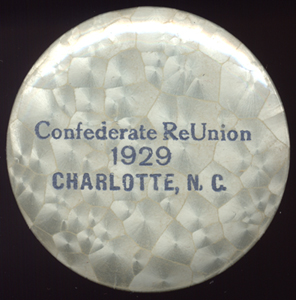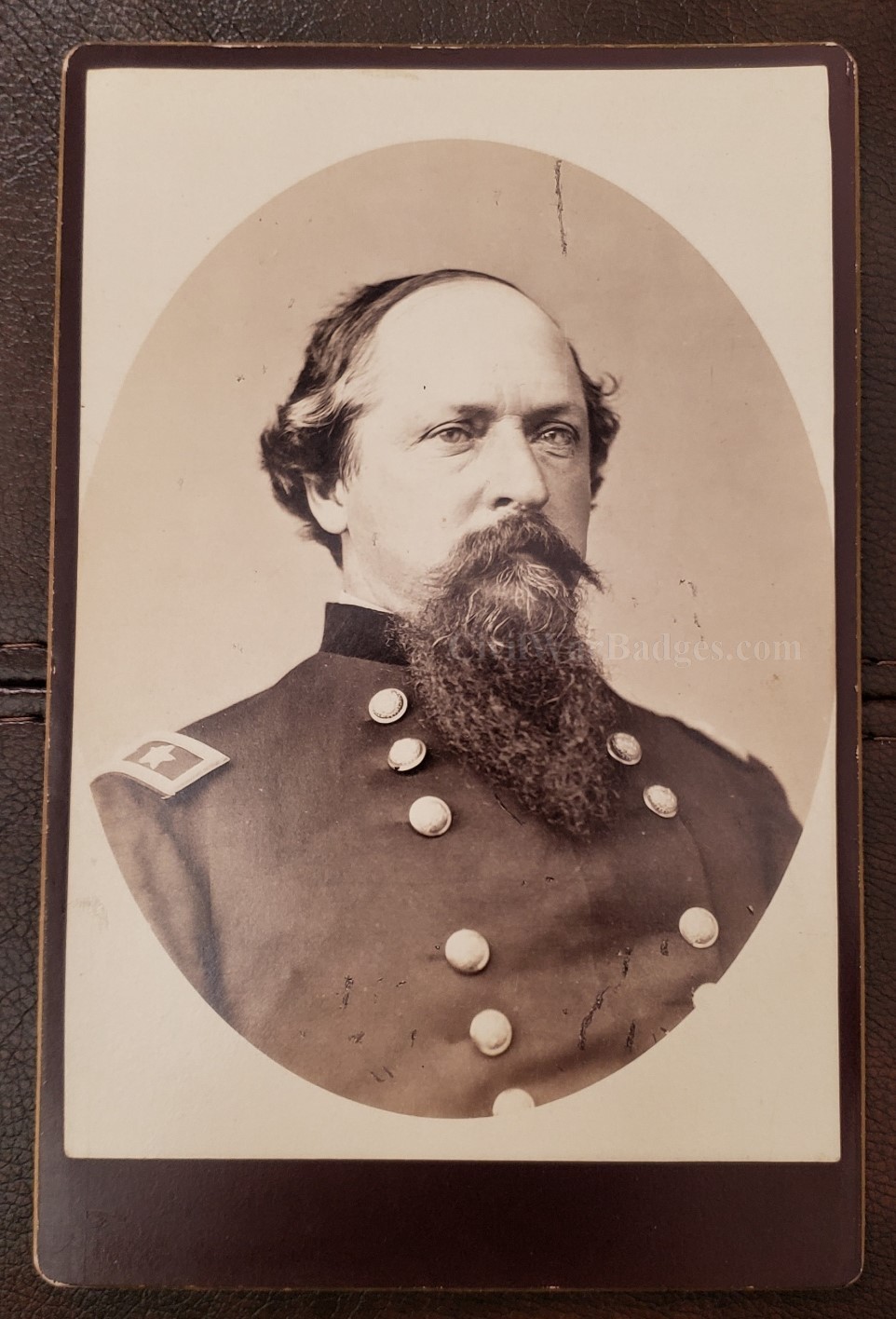CIVIL WAR PHOTO GENERAL JAMES B. RICKETTS
Item #: CWB11594
Click on an image to enlarge
CABINET CARD PHOTO OF GENERAL JAMES B. RICKETT
At the beginning of the Civil War, Ricketts served in the defenses of Washington, D.C., and commanded an artillery battery in the capture of Confederate-held Alexandria, Virginia, in early 1861. His battery was then attached to William B. Franklin's Brigade of Samuel Heintzelman's Division. He was shot four times and captured at the First Battle of Bull Run on July 21 when his battery, Battery I, 1st U.S. Artillery, was overrun by Confederate infantry. For his personal bravery in the face of overwhelming odds, on that same day Ricketts was brevetted as a lieutenant colonel in the Regular Army. He was confined as a prisoner of war in Richmond, although his wife Fannie was allowed to travel to Richmond and stay with him as his nurse. On December 18, 1861, he was exchanged for Confederate Colonel Julius A. De Lagnel. Ricketts was not paroled until January 1862, when he was placed on medical leave to recuperate. On April 30, 1862, President Abraham Lincoln appointed Ricketts a brigadier general of volunteers to rank from July 21, 1861.[2] The President had nominated Ricketts for the promotion on March 27, 1862, and the U.S. Senate confirmed the appointment on April 28, 1862.[2]
James and Fannie Ricketts
On his return to duty, Ricketts was assigned to command of a division in Irvin McDowell's corps, which he commanded at the Battle of Cedar Mountain, where he covered Nathaniel P. Banks's withdrawal. At Second Bull Run, his division was thrown forward by McDowell into Thoroughfare Gap to bar the advance of James Longstreet, who was seeking to unite his wing with that of Stonewall Jackson. Ricketts, who was being flanked and in danger of being cut off, withdrew. At the subsequent Battle of Antietam, he had two horses killed under him and he was badly injured when the second one fell on him. When he recovered sufficiently for duty, he was appointed to the Fitz John Porter court-martial. The trial was created to convict, with every judge beholden to Edwin M. Stanton for tenure or impending promotion except for Benjamin M. Prentiss. Ricketts probably voted for acquittal and was not promoted.He did not return to the field until March 1864, when he was assigned to a division of John Sedgwick's VI Corps, which he led through Ulysses S. Grant's Overland Campaign. Many of his men were former members of Robert H. Milroy's maligned Winchester command. The division performed poorly at the Battle of the Wilderness and without note at Spotsylvania Court House. However, Ricketts received the brevet of colonel, Regular Army, for gallant and meritorious services at Cold Harbor, Virginia, June 3, 1864, where he and his men performed well.In July 1864, Ricketts and his command, numbering only 3,350 men, were hurried north to oppose Jubal Early's attack on Washington, D.C. Ricketts fought at the Battle of Monocacy under Major General Lew Wallace, suffering the heaviest losses while holding the Union left flank. For his service there, on December 12, 1864, President Lincoln nominated Ricketts for appointment to the brevet grade of major general of volunteers, to rank from August 1, 1864, and the U.S. Senate confirmed the appointment on February 14, 1865.[3] Ricketts was engaged in Philip Sheridan's Shenandoah Valley Campaign. At the Battle of Cedar Creek, he commanded the VI Corps in the initial hours of the fighting but was wounded by a Minié ball through his chest that disabled him for life. Despite his poor health, he returned to command of his division two days before Robert E. Lee's surrender at Appomattox Court House, April 9, 1865.
At the beginning of the Civil War, Ricketts served in the defenses of Washington, D.C., and commanded an artillery battery in the capture of Confederate-held Alexandria, Virginia, in early 1861. His battery was then attached to William B. Franklin's Brigade of Samuel Heintzelman's Division. He was shot four times and captured at the First Battle of Bull Run on July 21 when his battery, Battery I, 1st U.S. Artillery, was overrun by Confederate infantry. For his personal bravery in the face of overwhelming odds, on that same day Ricketts was brevetted as a lieutenant colonel in the Regular Army. He was confined as a prisoner of war in Richmond, although his wife Fannie was allowed to travel to Richmond and stay with him as his nurse. On December 18, 1861, he was exchanged for Confederate Colonel Julius A. De Lagnel. Ricketts was not paroled until January 1862, when he was placed on medical leave to recuperate. On April 30, 1862, President Abraham Lincoln appointed Ricketts a brigadier general of volunteers to rank from July 21, 1861.[2] The President had nominated Ricketts for the promotion on March 27, 1862, and the U.S. Senate confirmed the appointment on April 28, 1862.[2]
James and Fannie Ricketts
On his return to duty, Ricketts was assigned to command of a division in Irvin McDowell's corps, which he commanded at the Battle of Cedar Mountain, where he covered Nathaniel P. Banks's withdrawal. At Second Bull Run, his division was thrown forward by McDowell into Thoroughfare Gap to bar the advance of James Longstreet, who was seeking to unite his wing with that of Stonewall Jackson. Ricketts, who was being flanked and in danger of being cut off, withdrew. At the subsequent Battle of Antietam, he had two horses killed under him and he was badly injured when the second one fell on him. When he recovered sufficiently for duty, he was appointed to the Fitz John Porter court-martial. The trial was created to convict, with every judge beholden to Edwin M. Stanton for tenure or impending promotion except for Benjamin M. Prentiss. Ricketts probably voted for acquittal and was not promoted.He did not return to the field until March 1864, when he was assigned to a division of John Sedgwick's VI Corps, which he led through Ulysses S. Grant's Overland Campaign. Many of his men were former members of Robert H. Milroy's maligned Winchester command. The division performed poorly at the Battle of the Wilderness and without note at Spotsylvania Court House. However, Ricketts received the brevet of colonel, Regular Army, for gallant and meritorious services at Cold Harbor, Virginia, June 3, 1864, where he and his men performed well.In July 1864, Ricketts and his command, numbering only 3,350 men, were hurried north to oppose Jubal Early's attack on Washington, D.C. Ricketts fought at the Battle of Monocacy under Major General Lew Wallace, suffering the heaviest losses while holding the Union left flank. For his service there, on December 12, 1864, President Lincoln nominated Ricketts for appointment to the brevet grade of major general of volunteers, to rank from August 1, 1864, and the U.S. Senate confirmed the appointment on February 14, 1865.[3] Ricketts was engaged in Philip Sheridan's Shenandoah Valley Campaign. At the Battle of Cedar Creek, he commanded the VI Corps in the initial hours of the fighting but was wounded by a Minié ball through his chest that disabled him for life. Despite his poor health, he returned to command of his division two days before Robert E. Lee's surrender at Appomattox Court House, April 9, 1865.
Shipping Weight:
0.3 lb
Item # CWB11594
$175.00 USD



